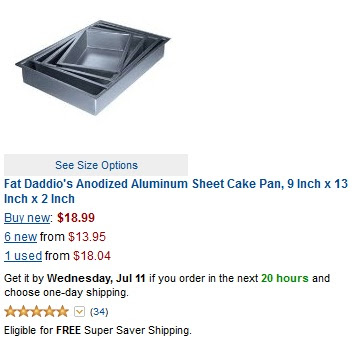Not all metals have the right properties to be used for the manufacturing of baking pans, since cooking usually requires heat conductivity and lack of chemical reaction with food. Unfortunately, the problem that has made the challenge of many generations was that of finding a metal that is both conductive and non-reactive; the best solution in the past was that of making the baking pans of a reactive material that was afterwards coated with a neutral one. Present day technologies make it possible for baking pans to be safe to use and extremely efficient for cooking, and aluminum, cast iron, stainless steel and carbon steel are the materials we should be grateful for.
Aluminum baking pans were considered great for a long period of time, particularly due to their exquisite thermal conductivity. Such pans heat immediately and evenly, without creating any hot spots. Aluminum raises no corrosion or rusting issues, nevertheless, the problem with such baking pans is that they react with certain acidic foods, influencing the taste of the dishes. Egg yolks, asparagus and artichokes are the right examples to give here. However, aluminum baking pans should not be banned from our kitchens, since in the anodized and cast forms, they are perfectly safe.
Aluminum baking pans were considered great for a long period of time, particularly due to their exquisite thermal conductivity. Such pans heat immediately and evenly, without creating any hot spots. Aluminum raises no corrosion or rusting issues, nevertheless, the problem with such baking pans is that they react with certain acidic foods, influencing the taste of the dishes. Egg yolks, asparagus and artichokes are the right examples to give here. However, aluminum baking pans should not be banned from our kitchens, since in the anodized and cast forms, they are perfectly safe.
Classical baking pans were made of tinned copper; they were great in terms of heat conductivity and pretty safe when it came to chemical reactions with acidic foods. The only problem with such baking pans is that quality models are pretty expensive nowadays, since they truly provide the most even type of heating. One other disadvantage related to the use of tinned copper baking pans is that of the tin layer thinning which requires periodical re-tinning. If you want to purchase copper baking pans, it would definitely be a good idea if you turned to the models with stainless steel linings rather than tin ones.
Stainless steel and carbon steel baking pans are other examples of cookware that we widely use on a daily basis. Stainless still is an alloy that is immune to corrosion or chemical reactions with acidic foods. Nevertheless, the only disadvantage here is that steel baking pans do not conduct heat evenly; however, a solution was found for this problem in the use of an aluminum or copper core in the internal pan structure. Carbon steel on the other hand heats rapidly, but not as well as other materials; yet, certain baking pans require different cooking temperatures like woks for instance, and for such cases carbon steel is simply perfect.












No comments:
Post a Comment